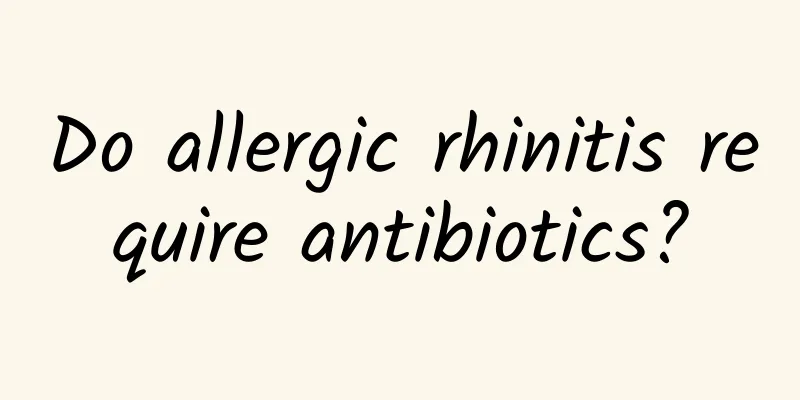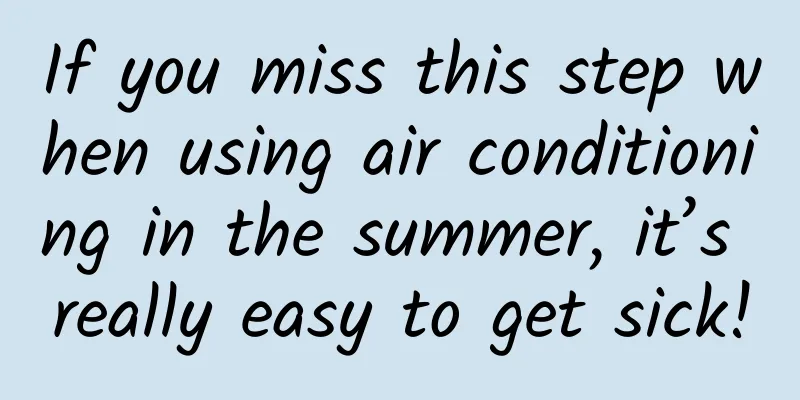Do allergic rhinitis require antibiotics?

|
Although some diseases are called "such and such inflammation", if they are treated with antibiotics, the results may be counterproductive. For example, antibiotics cannot be used casually for allergic rhinitis. In the spring when flowers bloom or when the seasons change, many children will frequently have runny nose, nasal congestion, nasal itching, and sneezing, many of which may be symptoms of allergic rhinitis. What is allergic rhinitis? Allergic rhinitis, formally known as allergic rhinitis, is manifested by paroxysmal runny nose, nasal congestion, sneezing, and nasal itching after contact with allergens; coughing; it can also cause itching of the eyes, ears, and palate; long-term exposure will cause children to become irritable and irritable. Depending on whether the clinical symptoms of allergic rhinitis change with the seasons, it can be divided into perennial allergic rhinitis and seasonal allergic rhinitis. The onset of perennial allergic rhinitis has nothing to do with the season. Symptoms occur all year round and may occur at any time, sometimes mild and sometimes severe. It may occur when you wake up in the morning and then gradually subside. Allergens such as indoor dust, animal fur, mites, etc., have basically the same symptoms as seasonal rhinitis, but the overall severity is milder than seasonal allergic rhinitis. Seasonal allergic rhinitis occurs seasonally, mostly in spring and autumn, and is common in teenagers. Symptoms can appear quickly and are more severe. They can last for hours, days, or even weeks, and the intervals between attacks are completely normal. The most common allergen is pollen, so it is easy to get sick when the flowers bloom in spring or the plants wither in autumn. After the spring and autumn seasons, the symptoms will naturally heal without treatment. How to treat allergic rhinitis? 1. Avoid allergens - Children with clear allergic factors should try to avoid contact with allergens. 2. Nasal irrigation - a safe and convenient treatment method that can flush away allergens and mucus, relieve children's discomfort and reduce allergic reactions. 3. Treatment drugs - nasal glucocorticoid spray, oral antihistamines, leukotriene receptor antagonists, mast cell stabilizers, etc. The main drugs are shown in the table below. 4. Specific immunotherapy - targeting specific allergens, inducing children to gradually develop immune tolerance, reducing or even eliminating clinical symptoms. Allergic rhinitis does not require antibiotic treatment. Allergic rhinitis is a chronic non-infectious inflammatory disease of the nasal mucosa, not an inflammation caused by pathogenic microorganisms (bacteria, viruses, chlamydia, etc.). Antibiotics are only effective against bacterial infections, while allergic rhinitis caused by allergens needs to be kept away from allergens, and glucocorticoids, antiallergic drugs, etc. should be used as prescribed by the doctor when necessary. |
<<: Insomnia, early awakening, headaches, and always avoiding problems may be anxiety disorder
Recommend
Can I apply Sanfu plaster during my period?
Women should not use Sanfu plaster during their m...
What will happen if I come to my aunt for tea?
The tea ceremony culture is profound and has a lo...
What is the cause of the small bumps next to the nipples?
Sometimes young women will find lumps on their br...
What to do if you have insomnia during your eighth month of pregnancy
Many women suffer from insomnia when they are 8 m...
Cancer caused by "scalding"? Hotpot lovers should be careful... Kang Kang Comic Science ④
recent Kang Kang's second uncle is not eating...
Why does snot always flow back into the throat? There are physiological and pathological reasons!
Author: Dai Jinsheng, attending physician, Beijin...
How long does it take to cook lotus seeds in a pressure cooker? How to deal with fresh lotus seeds
Lotus seeds, a Chinese medicine, are the dried ma...
I am 46 and I don't have my period. What should I eat?
Women enter menopause around age 50. After enteri...
Will abortion affect pregnancy again?
With the development of science and technology, t...
What should I pay attention to after cervical ablation?
Generally speaking, women who have given birth to...
There is dead skin on the nipple
Breasts are an area that women should pay special...
What does protein powder taste like? How long can protein powder be kept after opening?
Protein powder is a nutritional food supplement t...
Recently popular! Some netizens got "poisoned" after eating it... Southerners should pay special attention
Recently, it is the season for cassava to be put ...
The rise of mobile working – infographic
The development of mobile Internet has not only c...









